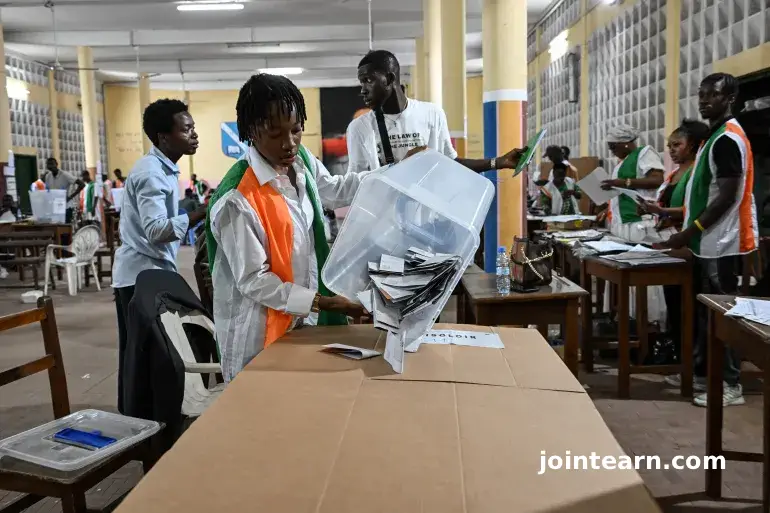
The 2025 Ivory Coast presidential election has stirred controversy as 83-year-old Alassane Ouattara seeks a fourth term amid opposition boycotts, constitutional debates, and fears of renewed unrest.
Election Day: High Stakes and High Tensions
ABIDJAN, October 25, 2025 — Vote counting is underway across Ivory Coast after a tense presidential election widely expected to deliver a fourth term to incumbent President Alassane Ouattara. Despite a relatively calm voting process, the election has been marked by deep political divisions, allegations of unfairness, and widespread voter apathy in some regions.
Nearly nine million Ivorians were registered to cast their ballots on Saturday, with five candidates competing for the presidency. Yet, the absence of major opposition figures — including former President Laurent Gbagbo, disqualified due to a criminal conviction, and former Credit Suisse CEO Tidjane Thiam, ruled ineligible for holding French citizenship — has fueled criticism that the race was effectively tilted in Ouattara’s favor.
Political analysts and observers noted that voter turnout would likely determine the perceived legitimacy of the election. While the opposition coalition called for a boycott, reports from Al Jazeera’s correspondents in Abidjan indicated that participation picked up significantly later in the day.
“In the morning there was visible apathy,” said Al Jazeera’s Ahmed Idris. “But by afternoon, long lines had formed across Abidjan and other regions, suggesting a stronger turnout than initially expected.”
The Candidates and Political Landscape
None of the four challengers had the organizational reach or resources of Ouattara’s ruling Rally of Houphouetistes for Democracy and Peace (RHDP), which dominates the political scene and controls much of the country’s state machinery.
Among those contesting were:
- Jean-Louis Billon, 60, a wealthy agribusinessman and former trade minister seeking to revive the legacy of the once-powerful Democratic Party.
- Simone Ehivet Gbagbo, 76, former first lady and long-time political figure, hoping to attract loyalists of her ex-husband, Laurent Gbagbo.
- Ahoua Don Mello, an independent leftist engineer with strong Pan-Africanist and pro-Russian leanings, appealing to younger voters disillusioned with the establishment.
- Henriette Lagou Adjoua, a centrist reformer and one of the country’s first female presidential candidates, representing the Group of Political Partners for Peace (GPPP).
Despite this diversity, political analysts say the fragmented opposition failed to form a united front, allowing Ouattara’s campaign to maintain a dominant lead.
At polling stations like Riviera Golf 1 Primary School in Abidjan, the mood remained calm and orderly.
“This vote means a lot to us,” said voter Konate Adama. “We hope it leads to peace and stability — not more division.”
Constitutional Controversy: Ouattara’s Fourth Term Debate
Ouattara’s bid for a fourth term has been one of the most contentious issues in Ivorian politics in recent years. Under the country’s 2016 constitution, presidents are limited to two terms. However, Ouattara insists that the constitutional reform effectively “reset” the term count, granting him legal grounds to run again.
His opponents have strongly rejected that interpretation, arguing it undermines democracy and weakens public trust in the rule of law.
“This is not just about legality — it’s about legitimacy,” said political analyst Charles Kouadio of the University of Abidjan. “Many Ivorians see this as a dangerous precedent.”
Security Tightened Amid Fear of Violence
Authorities deployed 44,000 security forces nationwide to secure polling stations and prevent unrest, particularly in opposition strongholds in the south and west. A night-time curfew was imposed on Friday and Saturday around Yamoussoukro, the political capital, as a precaution against post-election protests.
The government emphasized that these measures were necessary to avoid “chaos” and prevent a repeat of the 2020 election violence, when at least 85 people died according to official figures (and more than 200, according to opposition sources).
However, the opposition condemned the security clampdown and claimed that protest rights were being systematically suppressed. In recent weeks, several activists have been jailed for “disturbing the peace,” while an Independent Electoral Commission (CEI) office was set on fire on Monday during anti-government protests.
Economic Context: Ivory Coast’s Fragile Stability
Under Ouattara, Ivory Coast has experienced a decade of rapid economic growth, becoming West Africa’s fastest-growing economy and the world’s leading cocoa producer. Infrastructure projects, digital transformation, and foreign investment have boosted GDP and reduced poverty rates.
Yet, critics argue that economic gains have been unevenly distributed, with youth unemployment, rural poverty, and political exclusion fueling frustration among marginalized groups.
“Ivory Coast’s economy looks strong on paper,” said Marie Konan, a sociologist based in Bouaké. “But many citizens feel excluded from its benefits — and that fuels resentment toward the government.”
Election Results and Outlook
Preliminary results are expected early next week, with analysts predicting Ouattara will likely win outright in the first round, surpassing the 50 percent threshold required to avoid a runoff.
If confirmed, Ouattara’s victory would extend his 14-year rule, consolidating his position as one of Africa’s longest-serving leaders. However, the legitimacy of his mandate will depend heavily on voter turnout and the perceived fairness of the electoral process.
International observers from the African Union and ECOWAS have urged restraint from all parties, warning that any post-election unrest could threaten the fragile peace achieved after the 2010-2011 civil conflict, which left over 3,000 people dead.
“Ivory Coast has made progress, but its democracy remains fragile,” noted ECOWAS observer Amadou Cissé. “The coming days will test whether the country can prioritize stability over division.”


Leave a Reply